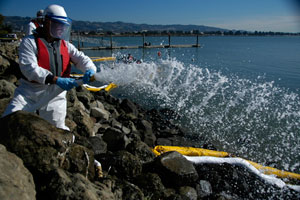One thing BP’s oil spill laid bare both how little data the government has on dispersants, which were used in unprecedented volumes in the Gulf, how poorly regulated these chemicals are. Since the disaster, several bills have been floated to tighten rules on the use of the chemicals, and the Environmental Protection Agency has signaled that it plans to take a closer look at how dispersants would be used in future spills. It’s probably little surprise, then, that the company that manufactured BP’s brand of choice, Corexit, has been beefing up its lobbying presence in Washington.
Nalco, the Illinois-based chemical company that produces Corexit, spent $90,000 on federal lobbying in the third quarter of 2010, according to the Center for Responsive Politics, bring its 2010 total so far up to $350,000. That brings the company’s total since the BP spill to $290,000—far more than the company has spent in the past decade. Nalco’s 2009 lobbying tab was just $90,000. The company spent no money on lobbying in 2008.
Of course, there’s more attention being paid this year to the dispersant products Nalco sells. A draft report from the National Oil Spill Commission found that the government’s lack of planning for dispersant use “handicapped” the response effort. I recently wrote about the much-needed overhaul of chemical policy, and both EPA and Congress have signaled that policy changes are coming. There have been multiple lawsuits over dispersants, most recently one from shrimpers and environmental groups calling for the EPA to stop further use of the chemicals until evaluation is completed.
The government’s lax oversight of dispersants facilitated BP’s unprecedented use of the chemicals in the Gulf. Over the course of the spill, 1.84 million gallons of Corexit was sprayed on the surface and injected at the spill site—despite the fact that the short—and long-term effects of the chemicals are poorly understood.




